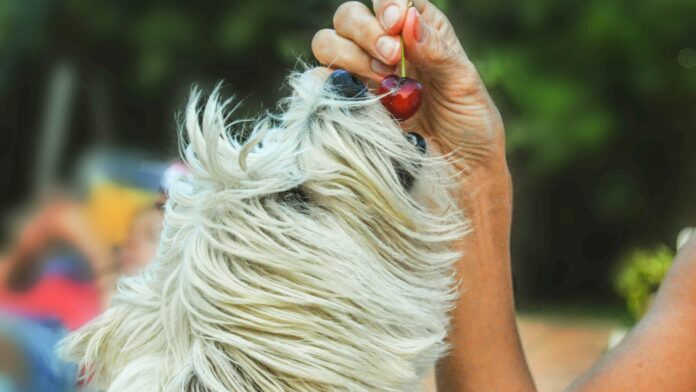Introduction to Can Dogs Eat Cherries
We’ve all been there—enjoying a juicy cherry and looking down to see your dog gazing up with those big, hopeful eyes. You might wonder, “Can I share this with my dog?” After all, cherries are healthy for us, packed with vitamins and antioxidants. But before you toss one to your furry friend, it’s important to know if cherries are safe for dogs. Spoiler alert: They’re not as harmless as you might think.
ALSO READ: Is Cesar Dog Food Good for Dogs? Unveiling the Truth
The Nutritional Value of Cherries (Can Dogs Eat Cherries)
Cherries are a superfood for humans. They’re rich in vitamin C, potassium, fiber, and antioxidants like anthocyanins. These nutrients support our immune system, heart health, and even help reduce inflammation. But what about for dogs?
Well, while those nutrients sound great, dogs have different dietary needs. The truth is, they don’t benefit from cherries the way we do. Dogs process foods differently, and the risks of feeding them cherries often outweigh any potential benefits.
Cherries are toxic to dogs due to several key factors:
- Cyanogenic Glycosides: The pits, stems, and leaves of cherries contain cyanogenic glycosides, which can release cyanide when ingested. Cyanide is highly toxic and can prevent cells from receiving oxygen, leading to symptoms like difficulty breathing, bright red gums, and even death in severe cases.
- Choking Hazard: The hard pits of cherries can pose a serious choking hazard, especially for small dogs. If swallowed, the pits can get lodged in the throat or digestive tract, causing blockages.
- Gastrointestinal Issues: Even the flesh of the cherry, which doesn’t contain cyanide, can cause gastrointestinal upset in dogs. The high sugar content can lead to symptoms like diarrhea, vomiting, and abdominal pain, particularly if consumed in large amounts.
- Intestinal Blockage: If a dog eats a large number of cherry pits, they can accumulate and cause a blockage in the intestines. This is a serious condition that may require surgery to resolve.
These factors make cherries a risky choice for dogs, and it’s generally best to avoid feeding them this fruit.
The Risks of Feeding Cherries to Dogs (Can Dogs Eat Cherries)
Let’s get to the nitty-gritty: cherries can be dangerous for dogs. The pits, stems, and leaves of cherries contain cyanogenic glycosides, which can release cyanide—a substance that’s toxic to dogs. Even small amounts can cause serious health problems.
Moreover, cherry pits pose a choking hazard and can cause intestinal blockages. If a dog eats too many, it could lead to cyanide poisoning. Symptoms to watch out for include difficulty breathing, bright red gums, dilated pupils, and vomiting. It’s a scary thought, but knowing the risks helps keep your dog safe.
Safe Ways to Feed Cherries to Dogs (Can Dogs Eat Cherries)
If you’re still set on giving cherries to your dog, there are a few things you must do. First, remove the pits, stems, and leaves completely. Only give them the fleshy part, and even then, only in very small amounts.
Moderation is crucial here. Due to the high sugar content in cherries, overfeeding can lead to weight gain or digestive issues. A few small bites as a rare treat is the best approach, and always keep an eye out for any adverse reactions.
But honestly, there are safer alternatives. Fruits like blueberries, apples (without seeds), and bananas are all dog-friendly and come with fewer risks.
What to Do If Your Dog Eats Cherries Accidentally (Can Dogs Eat Cherries)
If your dog accidentally eats cherries, don’t panic. Start by removing any remaining cherries from their reach. Then, monitor your dog closely for signs of distress, such as trouble breathing, vomiting, or bright red gums. If you see any of these symptoms, contact your vet immediately.
Even if your dog seems fine, it’s still a good idea to call your vet for advice. They may suggest bringing your dog in for a check-up or keeping a close watch at home. Prevention is the best approach, so make sure cherries and other potentially harmful foods are stored out of your dog’s reach.
Other Fruits That Are Safe for Dogs
If you want to share fruits with your dog, there are plenty of safe options. Blueberries, apples (without seeds), and strawberries are all excellent choices. These fruits are not only safe but also packed with vitamins and antioxidants that can benefit your dog’s health.
Remember, moderation is key. While fruits are a healthy treat, they shouldn’t make up more than 10% of your dog’s daily caloric intake. Overfeeding can lead to digestive issues and weight gain, so stick to small, occasional treats.
Conclusion
Feeding your dog human food is something we all do from time to time, but it’s important to know what’s safe and what’s not. Cherries might seem like a healthy snack, but they come with significant risks for dogs. From choking hazards to the potential for cyanide poisoning, cherries are best avoided.
Instead, stick to safer fruit options like blueberries, apples, and bananas. And remember, whenever you’re unsure about what to feed your dog, a quick call to your vet is always a good idea.
FAQs About Feeding Dogs Fruits
Q1. Can Dogs Eat Cherries Without Pits?
A. Even without pits, cherries aren’t the best treat for dogs. The high sugar content and potential for digestive upset make them a risky choice.
Q2. What Fruits Are Safe for Dogs?
A. Blueberries, apples (without seeds), bananas, and strawberries are all safe fruits for dogs. Always remove any seeds, pits, or rinds before serving.
Q3. How Much Fruit Can I Feed My Dog Daily?
A. Fruit should be an occasional treat, not a daily staple. Limit fruit treats to no more than 10% of your dog’s daily caloric intake.
Q4. Can Feeding Fruits Lead to Weight Gain in Dogs?
A. Yes, too much fruit can contribute to weight gain in dogs, especially those that are already prone to obesity. Moderation is key.
Q5. What Should I Do If My Dog Shows Signs of Fruit Poisoning?
A. If your dog shows signs of fruit poisoning—such as vomiting, diarrhea, or difficulty breathing—contact your veterinarian immediately. Early intervention is crucial.


